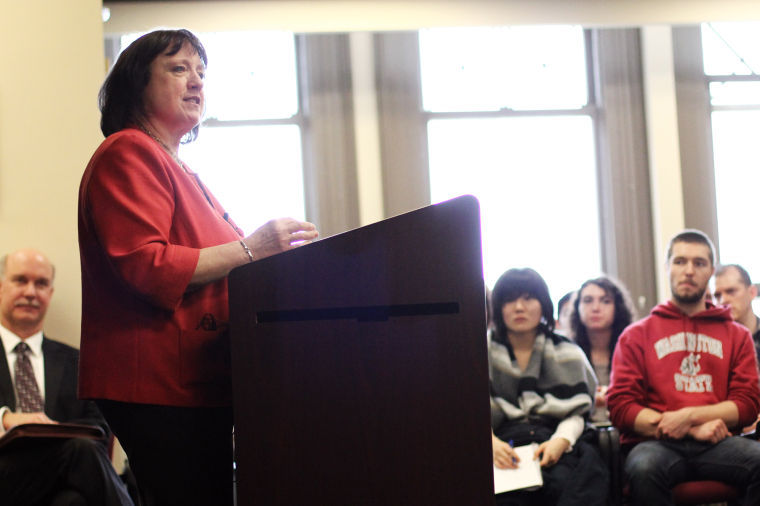State Supreme Courts powerful, but often forgotten
Washington state Supreme Court Chief Justice Barbara Madsen speaks during a Foley lecture in Bryan 308, Friday, March 28.
March 31, 2014
The judiciary system is an often overlooked aspect of government, said Chief Justice Barbara Madsen of the Washington state Supreme Court.
Madsen addressed students and faculty as part of the Foley Institute’s Coffee and Politics lecture series.
“The state’s courts are the most important part in our three piece government,” Madsen said. “Why don’t we talk about the courts when we teach about political science?”
Isabella Holroyd, sophomore and double major in political science and criminal justice, said she was surprised at the type of power the state Supreme Court had.
“I feel like in a lot of my classes we learn about the national supreme court, and don’t ever really talk about the state supreme court,” Holroyd said. “I didn’t realize how much power and influence they have over legislation.”
The court’s reach and authority are often not fully understood, Madsen said
“It’s not understood by the public, but not understood by the other branches of government as well,” Madsen said.
Madsen discussed the history of the foundation of the state government, and explained why it holds the role it does.
She said the state constitution was being written at a time in history when there was a fear of big business taking over the government.
“There was a fear that legislators would be in the pocket of big business,” Madsen said.
Madsen said because of this, a lot of trust and power was put with judiciary branch. She said the mistrust with the legislation is still seen today, with the state’s process of initiatives and referendums with passing bills.
“It’s more important than ever, in my view, that we have an independent judiciary,” Madsen said.
Junior and political science major Jamal Fakhreddine said he agreed with Madsen in that many people do not fully understand the role of the state supreme court.
“Her job is essentially to not have laws and strike them down, but to validate the constitutionality of them,” Fakhreddine said.
Fakhreddine said after hearing the lecture, he thinks the judiciary branch plays a fluid role in the government, having a large reach into the other branches.
Madsen said with the goal of being an independent branch of government, justices must be unbiased, while also having a politician’s mindset.
She said that can often be difficult, as many Supreme Court justices studied law, rather than political science. However, she said that even with the naivety many justices have when it comes to politics, the role of neutrality still remains important.
“The evidence has been that judges have become more and more convinced that their role is to stand between the government and big business,” Madsen said.
She said this evolving role is intended to protect the individual against the many.
“What we do is protect individual rights against big government,” Madsen said.
She gave an example of recent controversy over surveillance issues, and said Washington state has enhanced protection for individual privacy.
“Whether we continue to have privacy will depend on the judiciary,” Madsen said.
Madsen compared the Washington state Supreme Court to the U.S. Supreme Court, saying while the roles of the two are similar, the U.S. Supreme Court often looks to the actions of states before making decisions.
“The U.S. Supreme Court is making laws for the whole nation, so they’re looking to see what the states are doing,” Madsen said.
Because of this, there are important ways in which the state courts are doing more for citizens than the national Supreme Court, she said.
“It is a critical role for the development of a common law of the building of individual liberties,” Madsen said.





















